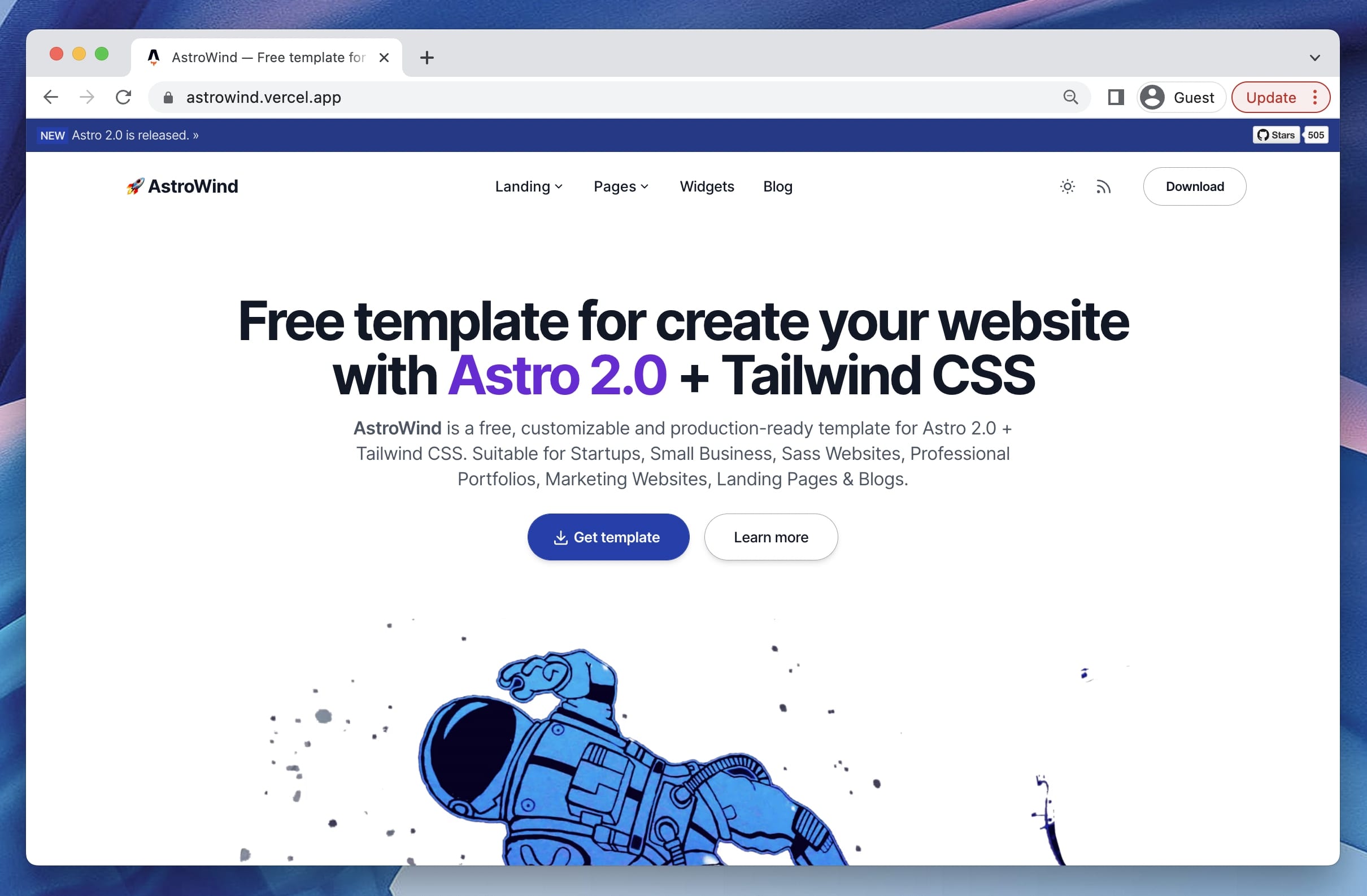🌟 Most starred & forked Astro theme in 2022. 🌟
AstroWind is a free and open-source template to make your website using Astro + Tailwind CSS. Ready to start a new project and designed taking into account web best practices.
- ✅ Integration with Tailwind CSS (@astrojs/tailwind) supporting Dark mode.
- ✅ Production-ready scores in Lighthouse and PageSpeed Insights reports.
- ✅ Fast and SEO friendly blog with automatic RSS feed (@astrojs/rss), MDX support, Categories & Tags, Social Share, ...
- ✅ Image optimization (@astrojs/images) and Font optimization.
- ✅ Generation of project sitemap based on your routes (@astrojs/sitemap).
- ✅ Open Graph tags for social media sharing.
- ✅ Analytics built-in Google Analytics, and Splitbee integration.
Table of Contents
📌 https://astrowind.vercel.app/
AstroWind tries to give you quick access to creating a website using Astro + Tailwind CSS. It's a free theme focuses on simplicity, good practices and high performance.
Very little vanilla javascript is used only to provide basic functionality so that each developer decides which framework (React, Vue, Svelte, Solid JS...) to use and how to approach their goals..
Inside AstroWind template, you'll see the following folders and files:
/
├── public/
│ ├── robots.txt
│ └── favicon.ico
├── src/
│ ├── assets/
│ │ ├── images/
| | └── styles/
| | └── base.css
│ ├── components/
│ │ ├── blog/
│ │ ├── common/
| | └── widgets/
| | ├── Header.astro
| | └── ...
│ ├── content/
│ | ├── blog/
│ | | ├── post-slug-1.md
│ | | ├── post-slug-2.mdx
│ | | └── ...
│ | └-- config.ts
│ ├── layouts/
│ | |── BaseLayout.astro
│ | └── ...
│ ├── pages/
│ | ├── [...blog]/
| | | ├── [category]/
| | | ├── [tag]/
| | | ├── [...page].astro
| | | └── [slug].astro
│ | ├── index.astro
| | ├── 404.astro
| | ├-- rss.xml.ts
│ | └── ...
│ ├── utils/
│ └── config.mjs
├── package.json
└── ...
Astro looks for .astro or .md files in the src/pages/ directory. Each page is exposed as a route based on its file name.
There's nothing special about src/components/, but that's where we like to put any Astro/React/Vue/Svelte/Preact components.
Any static assets, like images, can be placed in the public/ directory if they do not require any transformation or in the assets/ directory if they are imported directly.
🧑🚀 Seasoned astronaut? Delete this file. Update
config.mjsand contents. Have fun!
All commands are run from the root of the project, from a terminal:
| Command | Action |
|---|---|
npm install |
Installs dependencies |
npm run dev |
Starts local dev server at localhost:3000 |
npm run build |
Build your production site to ./dist/ |
npm run preview |
Preview your build locally, before deploying |
npm run format |
Format codes with Prettier |
npm run lint:eslint |
Run Eslint |
npm run astro ... |
Run CLI commands like astro add, astro preview |
Basic configuration file: ./src/config.mjs
const CONFIG = {
name: 'Example',
origin: 'https://example.com',
basePathname: '/', // Change this if you need to deploy to Github Pages, for example
trailingSlash: false, // Generate permalinks with or without "/" at the end
title: 'Example - This is the homepage title of Example', // Default seo title
description: 'This is the homepage description of Example', // Default seo description
defaultImage: 'image.jpg', // Default seo image
defaultTheme: 'system', // Values: "system" | "light" | "dark" | "light:only" | "dark:only"
language: 'en', // Default language
textDirection: 'ltr', // Default html text direction
dateFormatter: new Intl.DateTimeFormat('en', {
// Date format
year: 'numeric',
month: 'short',
day: 'numeric',
timeZone: 'UTC',
}),
googleAnalyticsId: false, // Or "G-XXXXXXXXXX",
googleSiteVerificationId: false, // Or some value,
blog: {
disabled: false,
postsPerPage: 4,
list: {
pathname: 'blog', // Blog main path, you can change this to "articles" (/articles)
noindex: false,
disabled: false,
},
post: {
pathname: '', // Empty for /some-post, value for /pathname/some-post
noindex: false,
disabled: false,
},
category: {
pathname: 'category', // Set empty to change from /category/some-category to /some-category
noindex: true,
disabled: false,
},
tag: {
pathname: 'tag', // Set empty to change from /tag/some-tag to /some-tag
noindex: true,
disabled: false,
},
},
};You can create an optimized production build with:
npm run buildNow, your website is ready to be deployed. All generated files are located at
dist folder, which you can deploy the folder to any hosting service you
prefer.
Clone this repository on own GitHub account and deploy to Netlify:
Clone this repository on own GitHub account and deploy to Vercel:
- Improve blog design (More generic design that adapts to more needs).
- Create component or utilities for related posts.
- Add more shortcodes or embed functions to posts in Markdown: (eg Video, Tweet...).
- Add more Tailwind components useful for most scenarios (Features, Contact, Call to Actions, Content, FAQs...)
- Add commonly used example pages (Ex: About, Terms, Profile, Services...).
- Create detailed documentation with best practices and redesign tips.
- Create external library or place with useful Tailwind components.
- Create examples of AstroWind in CodeSanbox or a similar platform that can be easily synchronized with new updates. (Redesign, Integration with React or Svelte components, Use of Tailwind plugins, Connection to headless CMS ...).
- Why?
- Qwind - A template to make your website using Qwik + Tailwind CSS.
If you have any idea, suggestions or find any bugs, feel free to open a discussion, an issue or create a pull request. That would be very useful for all of us and we would be happy to listen and take action.
Initially created by onWidget and maintained by a community of contributors.
AstroWind is licensed under the MIT license — see the LICENSE file for details.








